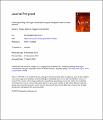Predicting limiting ‘free sugar’ consumption using an integrated model of health behavior
Phipps, D. J., Hagger, M. S., & Hamilton, K. (2020). Predicting limiting ‘free sugar’ consumption using an integrated model of health behavior. Appetite, 150, Article 104668. https://doi.org/10.1016/j.appet.2020.104668
Julkaistu sarjassa
AppetitePäivämäärä
2020Tekijänoikeudet
© 2020 Elsevier Ltd.
Excess intake of ‘free sugars’ is a key predictor of chronic disease, obesity, and dental ill health. Given the importance of determining modifiable predictors of free sugar-related dietary behaviors, we applied the integrated behavior change model to predict free sugar limiting behaviors. The model includes constructs representing ‘reasoned’ or deliberative processes that lead to action (e.g., social cognition constructs, intentions), and constructs representing ‘non-conscious’ or implicit processes (e.g., implicit attitudes, behavioral automaticity) as predictors of behavior. Undergraduate students (N = 205) completed measures of autonomous and controlled motivation, the theory of planned behavior (TPB) measures of explicit attitude, subjective norms, perceived behavioral control (PBC), and intentions, past behavior, implicit attitude, and behavioral automaticity at an initial point in time, and free sugar limiting behavior and behavioral automaticity two weeks later. A Bayesian structural equation model indicated that explicit attitude, subjective norms, and PBC predicted behavior via intention. Autonomous motivation predicted behavior indirectly through all TPB variables, while controlled motivation predicted behavior only via subjective norms. Implicit attitudes and behavioral automaticity predicted behavior directly and independently. Past behavior predicted behavior directly and indirectly through behavioral automaticity and intentions, but not implicit attitudes. Current findings suggest pervasive effects of constructs representing both reasoned and non-conscious processes and signpost potential targets for behavioral interventions aimed at minimizing free sugar consumption. ...
...
 ...
...
Julkaisija
ElsevierISSN Hae Julkaisufoorumista
0195-6663Asiasanat
Julkaisu tutkimustietojärjestelmässä
https://converis.jyu.fi/converis/portal/detail/Publication/34985684
Metadata
Näytä kaikki kuvailutiedotKokoelmat
- Liikuntatieteiden tiedekunta [3164]
Lisätietoja rahoituksesta
No funding information.Lisenssi
Samankaltainen aineisto
Näytetään aineistoja, joilla on samankaltainen nimeke tai asiasanat.
-
Predicting Adolescents’ Physical Activity Intentions : Testing an Integrated Social Cognition Model
Balla, Jessica; Polet, Juho; Kokko, Sami; Hirvensalo, Mirja; Vasankari, Tommi; Lintunen, Taru; Hagger, Martin S. (Springer, 2024)Background: Few adolescents meet guideline levels of physical activity associated with good health, highlighting the need for intervention. Interventions promoting adolescents’ physical activity should be guided by research ... -
Predicting physical distancing over time during COVID-19 : testing an integrated model
Hagger, Martin S.; Smith, Stephanie R.; Keech, Jacob J.; Moyers, Susette A.; Hamilton, Kyra (Routledge, 2022)Objective: We applied an integrated social cognition model to predict physical distancing behavior, a key COVID-19 preventive behavior, over a four-month period. Design: A three-wave longitudinal survey design. Methods: ... -
An integrated dual process model in predicting e‐cigarette use in undergraduate students
Phipps, Daniel J.; Nott, Natasha J.; Hamilton, Kyra (Wiley, 2024)The use of e-cigarette or vape devices is a growing concern on an international scale, given the devices' addictive nature and questions regarding their short- and long-term health impacts. Their use is especially an issue ... -
Predicting Social Distancing Intention and Behavior During the COVID-19 Pandemic : An Integrated Social Cognition Model
Hagger, Martin S; Smith, Stephanie R; Keech, Jacob J; Moyers, Susette A; Hamilton, Kyra (Oxford University Press (OUP), 2020)Background Social distancing is a key behavior to minimize COVID-19 infections. Identification of potentially modifiable determinants of social distancing behavior may provide essential evidence to inform social distancing ... -
Adolescent sugar-sweetened beverage consumption : An extended Health Action Process Approach
Zhang, Chun-Qing; Wong, Marco Cheuk-Yiu; Zhang, Ru; Hamilton, Kyra; Hagger, Martin S. (Elsevier, 2019)Objective: Consumption of excess added sugar in the form of sugar-sweetened beverages (SSBs) contributes to a wide range of health concerns in adolescents. Identification of modifiable determinants of SSB consumption based ...
Ellei toisin mainittu, julkisesti saatavilla olevia JYX-metatietoja (poislukien tiivistelmät) saa vapaasti uudelleenkäyttää CC0-lisenssillä.

